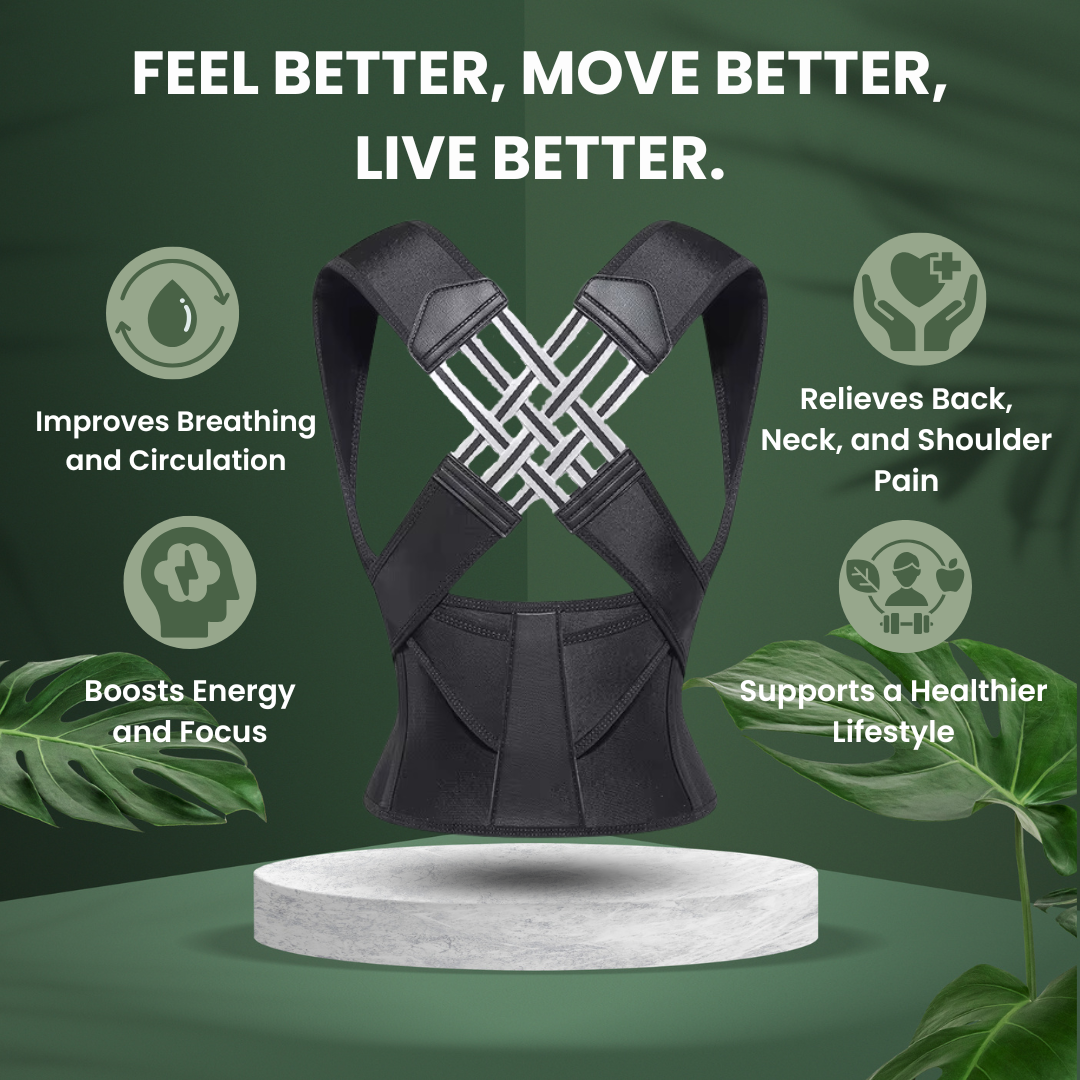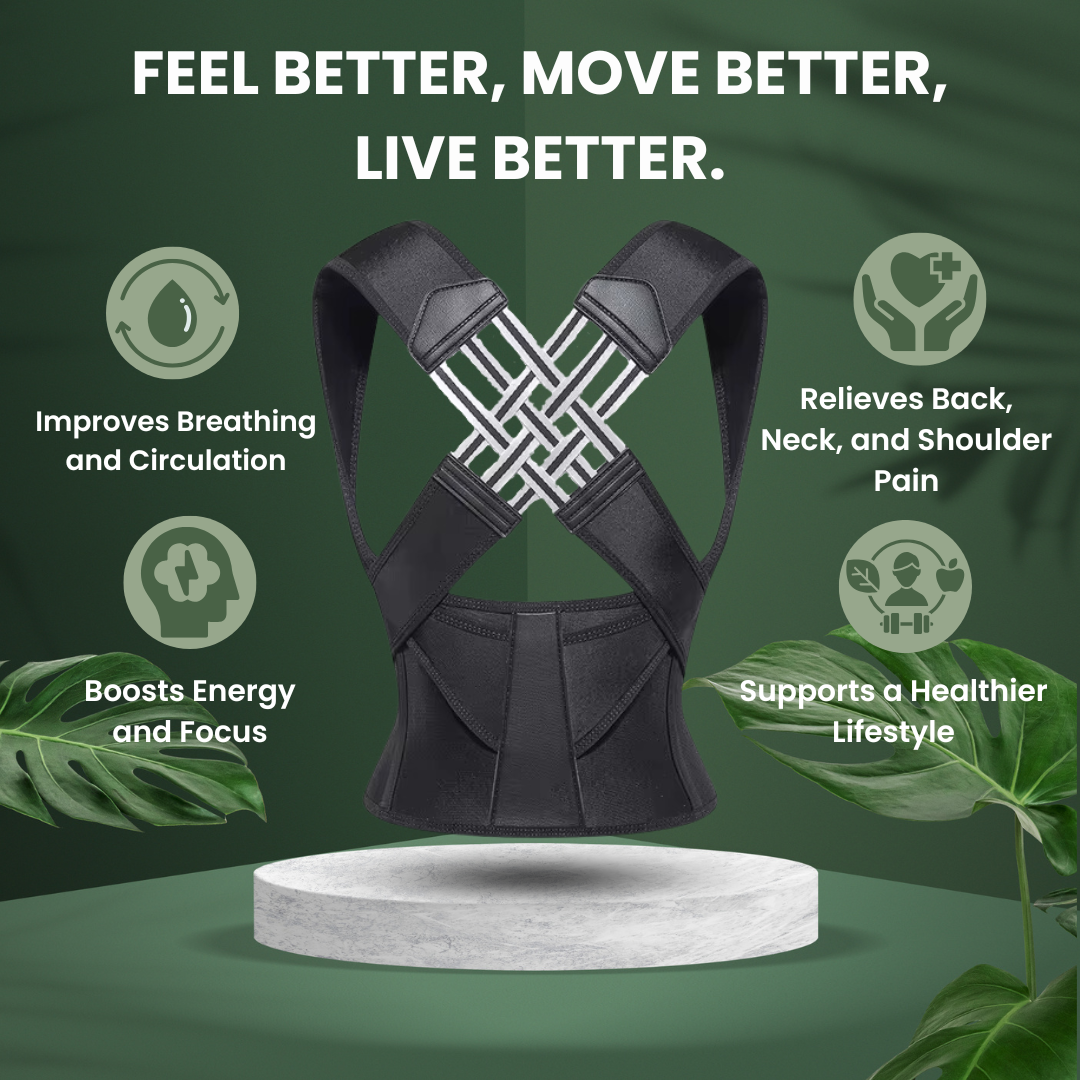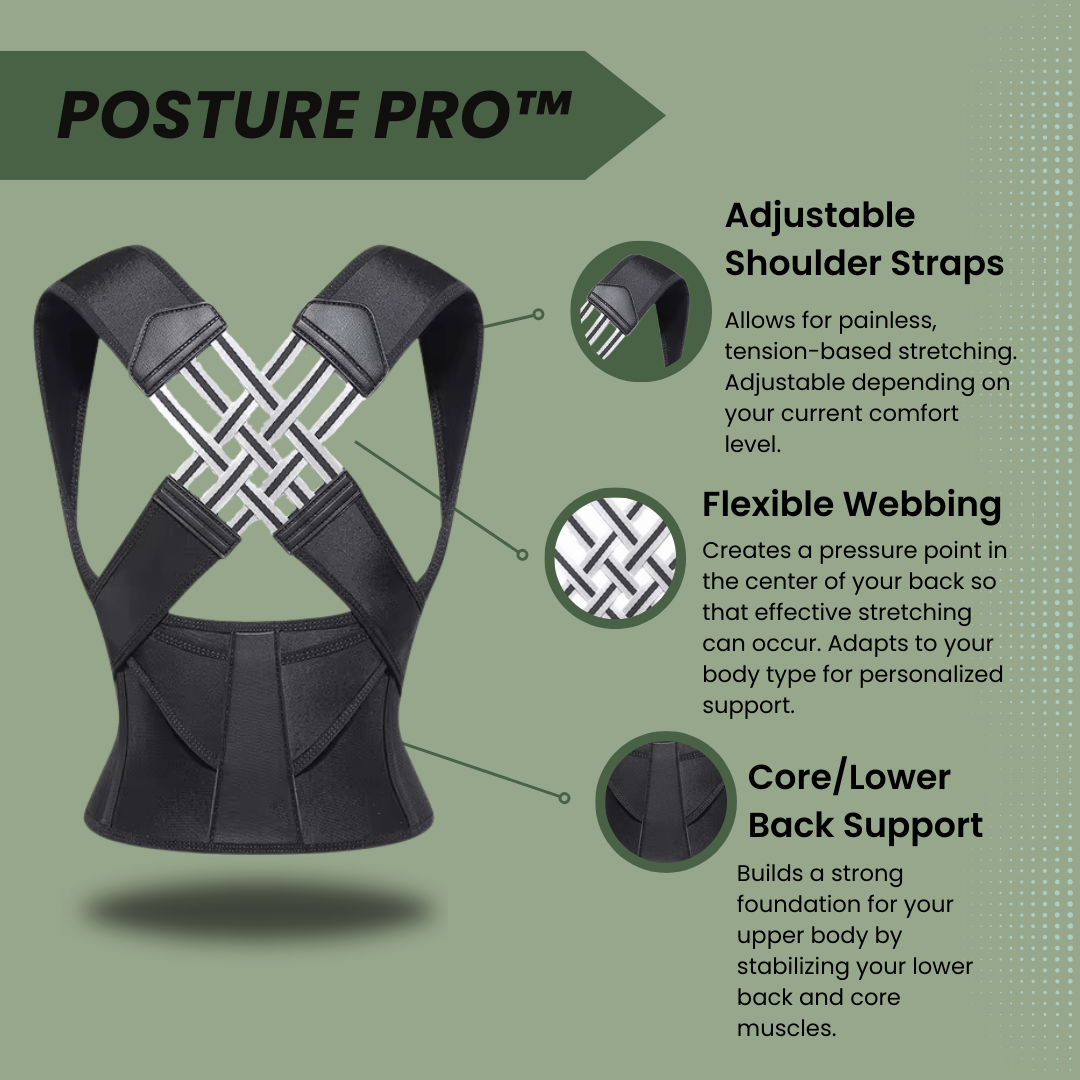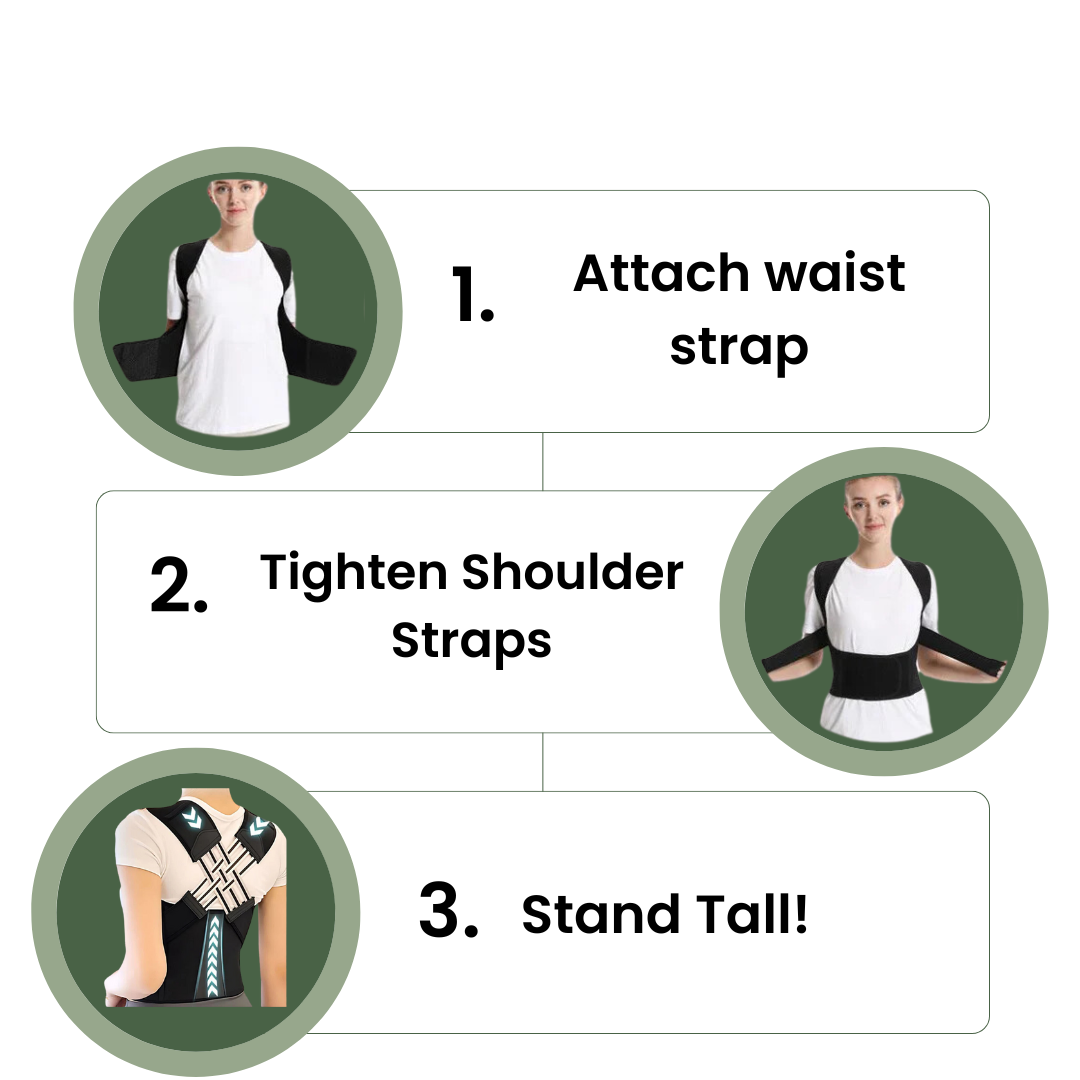Many people struggle with getting good sleep. Wearing a posture corrector for better sleep can help. This article talks about how the way you sit and stand affects your sleep. Keep reading to learn more.
Key Takeaways
- Good posture during sleep is key to avoiding neck and lower back pain. A neutral spine position helps prevent strain.
- Side sleeping is common but requires pillows for spinal alignment. Back sleeping supports good posture, while stomach sleeping can cause harm.
- Posture correctors at night can ease discomfort from poor sleep positions. Alternatives include supportive mattresses, yoga, and proper sleep hygiene practices.
The Connection Between Sleep and Posture
Good posture is crucial for a good night's sleep. Proper spinal alignment ensures better sleep quality. Poor posture can lead to neck and lower back pain, impacting the overall sleeping experience.
Importance of spinal alignment during sleep
Keeping your spine straight while you sleep is very important. This helps to stop back and neck pain. Your spine should stay in a neutral position all night. This means it shouldn't bend too much in any direction.
A good pillow keeps your head and neck lined up with your spine.
A neutral spine position during sleep reduces strain and prevents pain.
Sleeping on your stomach is bad for this alignment, leading to neck strains and more muscle pains. Choosing the right mattress supports this as well. It needs to be firm enough to hold your body but soft enough for comfort.
Impact of poor posture on sleep quality
Bad posture can lead to neck and back pain. This makes it hard for adults to sleep well. About 84% of adults feel back pain at some point. Much of this is because of the way they sleep.
Sleeping wrong puts stress on the spine. A stressed spine harms sleep quality.
Using a firm mattress helps align your spine when you sleep.
A good pillow also supports your neck and keeps your spine straight.
These things help reduce pain from sleeping in a bad position.
Sleeping right means waking up feeling better.
Common Sleep Positions and Their Effects on Posture

Side sleeping, a popular sleep position, can strain the spine and lead to neck and lower back pain. Back sleeping is often recommended for good posture as it helps align the spine, reducing pressure points.
Stomach sleeping can cause strain on the neck and lower back due to the unnatural position of the head and arching of the back.
Side sleeping
Over 60% of adults prefer lying on their side to sleep. This position has its perks. It can cut down on snoring and help with heartburn. For those with sleep apnea, it might make breathing easier at night.
Pregnant women find this pose helpful too, especially on the left side. It boosts blood flow to the baby.
To keep your spine straight while you sleep this way, using pillows is smart. Put one between your knees to ease hip tension. This trick helps keep everything in line from your head down to your feet.
People with neck pain or lower back issues often find relief this way too since it supports the natural curve of your spine.
Back sleeping
Back sleeping is the most preferred sleep position for maintaining good spinal alignment. It helps to evenly distribute weight and prevents excess strain on the spine, lowering the risk of neck and lower back pain.
To support back sleeping, it's crucial to use a pillow that provides adequate neck support and maintains the natural curvature of the spine.
Improper sleep positions such as stomach sleeping can lead to orthopedic issues like backaches, muscle soreness, and even more severe conditions like herniated discs or chronic lower back pain.
Therefore, if you're prone to these posture-related problems, focusing on adjusting your sleep position may significantly improve your overall posture and reduce associated discomfort.
Stomach sleeping
Stomach sleeping isn't the best choice, making up less than 10% of overall sleep time. While it might help with snoring, it can also lead to difficulties in breathing and is not recommended for pregnant women or those concerned about wrinkles.
It's particularly not advised for anyone experiencing neck or back pain as twisting the neck during this position can cause spinal misalignment.
Sleeping on the stomach does have its downsides that can affect your overall health and comfort.
Role of Posture Correctors in Sleep
Posture correctors can help improve spinal alignment during sleep, reducing neck and lower back pain. They provide support to maintain good posture and alleviate muscle strain. Using a supportive mattress, firm pillow, or specialized sleeping bra can also contribute to better sleep posture.
Benefits of using posture correctors at night
Using posture correctors at night can help alleviate discomfort and pain resulting from poor sleep posture. By maintaining proper alignment while sleeping, these correctors activate muscles that may not have been adequately engaged, potentially improving overall sleep quality.
Moreover, using posture correctors enhances awareness of good posture, aiding in self-correction during sleep. They provide a guide for muscle positioning and can aid in reducing neck and lower back pain.
The use of posture correctors at night also complements other efforts to improve postural habits such as supportive mattresses and pillow support, which combined can contribute to better spinal alignment during sleep.
These devices are tailored to enhance the natural curves of the spine and could be especially beneficial for individuals experiencing musculoskeletal strain due to poor posture during rest.
Alternatives to posture correctors for improving sleep posture
You can improve sleep posture without using posture correctors:
- Choose a supportive mattress and firm pillow to maintain spinal alignment.
- Engage in mind-body exercises like yoga to improve body awareness and identify problematic sleep positions.
- Consider ergonomic sleeping aids, such as lumbar support pillows or specially designed neck support pillows.
- Implement proper sleep hygiene practices, including maintaining a consistent sleep schedule and creating a comfortable sleep environment.
- Seek guidance from healthcare professionals or physical therapists for personalized recommendations on improving sleep posture.
Conclusion
Proper posture is crucial for quality sleep. It affects the spine, muscles, and internal organs. Posture correctors may not be best for bedtime use but could improve waking posture and reduce pain if used correctly.
Sleeping on your back is optimal to maintain natural spinal alignment. Side sleeping can strain the neck and shoulders, leading to misalignment; stomach sleeping is considered harmful for posture improvement.
Maintaining good posture during sleep requires attention just like it does throughout the day. Regular exercise, particularly focused on strengthening back and shoulder muscles, can significantly enhance posture and alleviate pain.
In conclusion, being mindful of your sleeping position can have a big impact on your overall well-being. Good habits during rest will reflect positively on how you feel when you're awake.
FAQs
1. How does posture affect sleep?
Posture, whether good or bad, has a significant impact on your sleep. Poor posture can lead to muscle strain and weakness, neck pain, lower back pain and even shoulder pain. On the other hand, maintaining a good sleeping posture can help alleviate these issues.
2. What are some ways to improve my sleeping posture?
Improving your sleeping posture involves several strategies such as using supportive mattresses and pillows for proper alignment of the spinal column; it also includes avoiding positions that cause stress on your hip joints or spinal curvature.
3. Can wearing a posture corrector help with my sleep quality?
Yes! Posture correctors like back braces and Etalon's sports bras designed specifically for postural support work by aligning the vertebrae in your back which could offer relief from issues like bulging discs and chronic low-back pain thus improving your sleep quality.
4. Does poor posture only lead to physical discomfort during sleep?
No, indeed not! Beyond physical discomforts like muscle strains or pulled muscles in the lower-back area, poor sleeping postures might exacerbate conditions like obstructive sleep apnea or acid reflux due to improper alignment of breathing passages.
5. Are there any exercises that can help improve my overall body shape for better sleeping postures?
Absolutely! Exercises targeting core strength improvement like yoga strap workouts coupled with breathing exercises could enhance proprioceptive senses leading to improved working conditions for all muscles involved in maintaining good postures including those around waists and hips areas.
6. Should I consider getting professional advice if I have persistent problems related to poor sleeping postures causing severe pains or swelling despite trying various remedies at home?
Certainly! If you're dealing with persistent lumbar back-pain despite attempts at self-care through cold therapy or use of products like Upright Go designed for lumbar support; then consulting professionals such as chiropractors would be advisable since they could provide targeted treatments for your specific issues.



















